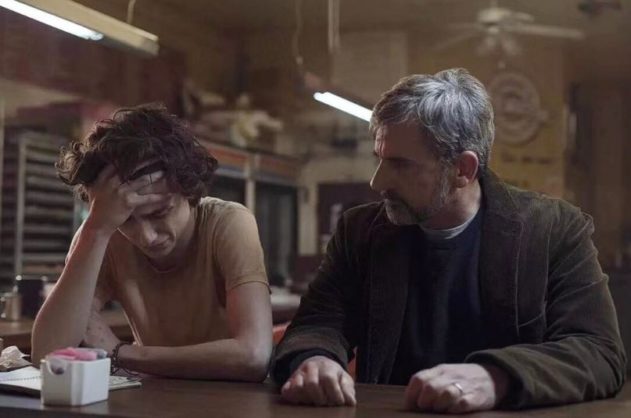“Beautiful Boy,” or how the loving and considerate can also be destructive and self-obsessed
It is a fact, sadly, that addiction will touch almost everyone’s lives, even the most accomplished among us.
This is what happened to Nic Sheff, a top-of-his-class teen who started experimenting with pot before moving into harder drugs, gradually spiraling into a harrowing cycle of highs, lows, homelessness, sobriety and relapse. His father, Rolling Stone writer David Sheff, could only watch helplessly as Nic’s roller-coaster ride became worse, until he stole money from his own family to feed his addiction.
David Sheff turned his pain into a memoir, “Beautiful Boy: A Father’s Journey Through His Son’s Addiction.” Nic, too, started to write, with two books called “Tweak” and “We All Fall Down: Living With Addiction.” David’s book is now a film starring Steve Carell as David and Timothée Chalamet (“Call Me By Your Name”) as Nic.
“I’ve seen a lot of people struggle with [addiction], so it’s always been around,” said “Beautiful Boy” director Felix Van Groeningen during a press tour in Washington, D.C., recently to discuss the film. “I think, in a sense, it’s even been around when we didn’t totally acknowledge that it was.”
Van Groeningen, a Belgian filmmaker, had been looking for his entry into English-language films when “Beautiful Boy” caught his attention. He co-wrote the screenplay adaptation with Luke Davies (“Lion”) and began rehearsing with Carell, Chalamet and the rest of the actors who would become the Sheff “family” in the film.
“For me it’s always a fun time to get to know each other, to try things—to work the scenes also and rewrite a little bit if necessary,” Van Groeningen said of the rehearsal process. “I’m glad we did it.”
As “Beautiful Boy” opens, David Sheff is facing the camera, as if in confession, speaking to an offscreen medical professional (Timothy Hutton). At first we are meant to think that Sheff is perhaps interviewing the doctor, but as the minute-long scene unfurls, Sheff forces himself to reveal that he is in fact seeking help for his son.
It’s a minimalist approach, and much of “Beautiful Boy” is free of overt camera moves or fancy editing tricks, thereby adding to its realism.
“A film finds its own style. It wasn’t my first film, and I’ve been working with the same [cinematographer] for over fifteen years,” Van Groeningen said of once again choosing to work with director of photography Ruben Impens.
“I think we used more Steadicam than we had maybe set out to do,” Van Groeningen said, adding that the Paul Thomas Anderson film “The Master” was an influence on his own style. “But it was always there, and it felt like it worked.”
Carell and Chalamet are both Oscar nominees, with the former having followed the Tom Hanks path from successful comedian to legitimate dramatic actor. Indeed, in “Beautiful Boy,” Carell’s performance is understated with barely-contained fury as his frustration with the situation of his drug-addicted son continues to escalate.
“I wasn’t [weighing] what people think Steve Carell would do. It’s just about what feels right and what feels true to this character,” Van Groeningen said.
The Sheff father and son have both seen “Beautiful Boy,” and have joined the director, who became a father himself recently, for post-discussion screenings with audiences, during which they shared stories that came after the books’ publications.
“They wrote their books to share their stories because they thought they could help other people, and it did, I think,” Van Groeningen said. “It starts conversations. They’re still very committed to reaching out to people, or people reach out to them to try to help them. They are on the road often to talk about it.
“One of the things that we had to embrace that was hard [was] the repetitive nature of addiction, which is what made it really hard to make this story work,” he said. “But ending where we [did] made sense in order to tell a story that is hopeful but that isn’t forcing a happy ending.”
“Beautiful Boy” opens nationwide Oct. 12.
Eric Althoff is special to ScreenComment (@SingerWriterEFA)
READ MORE: Timothée Chalamet in “Call me by your name” (see our review)
news via inbox
Nulla turp dis cursus. Integer liberos euismod pretium faucibua



